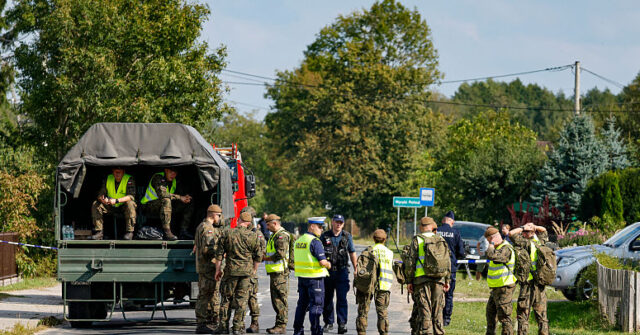Poland contradicted the public line of President Donald Trump and top NATO commanders that the arrival of up to two dozen Russian drones into alliance airspace this week could have been unintentional, stating on Friday “it wasn’t. And we know it.”
U.S. President Donald Trump said on Thursday evening in Washington D.C. in brief remarks of a group of Russian drones that overflew Ukraine and Belarus into NATO ally member state Poland that it “could have been a mistake. But regardless I’m not happy about anything to do with that whole situation, but hopefully it is going to come to an end”.
Those comments followed others by United States European Command and Supreme Allied Commander Europe General Alexus Grynkewich who said “we do not yet know if this was an intentional act or an unintentional act”.
On Friday Poland’s leaders claimed to have better information, making totally clear their belief the Russian drones were sent to the country deliberately. Prime Minister Donald Tusk, a former European Commissioner, said on Friday morning: “We would also wish that the drone attack on Poland was a mistake. But it wasn’t. And we know it”.
His foreign policy chief Radosław ‘Radek’ Sikorski, who is visiting Kyiv this morning, was more expansive in his remarks. “No, it wasn’t a mistake”, he said, later adding while standing outside the Polish Embassy in Kyiv: “the night when 19 Russian drones breached Polish airspace, 400 drones and 40 missiles were launched over Ukraine. It was not a mistake”.
Sikorski had also commented earlier in the week, when he cited the Polish Air Force to remark: “the assessment of Polish and NATO air forces is that they did not veer off course but were deliberately targeted… I am aware that Russia claims there is no evidence these were Russian drones, even suggesting a Ukrainian provocation. This was anticipated. Lies and denials are default Soviet responses. The Kremlin is again mocking President Trump’s peace efforts.”
In a further development on Friday, as noted by The Guardian, an aide to the Polish President told national radio that the government had revised the number of Russian drones they believed had entered the country from 19 to 21, but not all of them have been found so far. Separately it is stated that the wreckage of 17 has been retrieved by this point.
As reported on Wednesday as the news of the missile incursion broke, drones crossed into Poland from Ukrainian and Belarussian airspace and three were deemed enough of a threat to be intercepted and shot down by NATO air defence stationed in the country. The remainder crashed harmlessly in rural areas. There were no injuries or fatalities but a residential property was damaged.
Polish PM Tusk said then the incursion was “unprecedented”, noting it was the “first time Russian drones have been shot down over the territory of a NATO country”.
Because drones are expensive to shoot down, it is often better to let the ones not directly threatening targets to crash on their own, and to misdirect others towards uninhabited areas using electronic warfare countermeasures. With this going on at such a high level night after night through the course of the war, there have been cases of individual rogue drones and missiles finding their way into Poland. Yet the sheer scale of Wednesday’s incursion has led to claims it was far from accidental, or a by-product of Ukrainian air defence.
Germany’s Die Welt broadsheet newspaper claims sight of an internal NATO briefing on the drones and to have spoken to a “high-ranking NATO officer” who told them “Based on current information, we assume that the drones most likely intentionally entered NATO airspace”. This is because five of the drones in the night-long wave to enter Poland were on “a direct flight path towards a NATO base” that the alliance uses to send military supplies to Ukraine.
All three of the Russian drones that were shot down overnight into Wednesday were in that group apparently targeting the NATO airbase and were splashed by Dutch F-35 fighters attached to the NATO mission. The two other drones on that flightpath were crashed by other means, it was claimed.
Whether the bearing on the NATO base as claimed in the Welt report was deliberate or not will continue to be discussed, whether this was an actual attack seems less certain given of the 17 wrecked drones recovered so far, none were found to be carrying an explosive charge, making them probably decoys or intelligence-gathering assets.
NATO leaders are due to hold a press conference on the drone threat later on Friday.
This story is developing, more follows
Read the full article here


